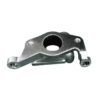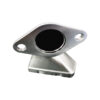Motorschmiedekipphebel
Motorschmiedekipphebel
Verbessern Sie die Leistung Ihres Motors mit unseren präzisionsgefertigten Motorschmiedekipphebel, entwickelt für Langlebigkeit und reibungslosen Ventilbetrieb. Dieser hochwertige Motor-Schmiedekipphebel sorgt für optimale Effizienz und Zuverlässigkeit Ihres Fahrzeugs. Vertrauen Sie unserer Lösung, um die Leistung und Langlebigkeit Ihres Motors zu steigern.
Verbessern Sie die Leistung und Zuverlässigkeit Ihres Motors mit unseren präzisionsgefertigter Motor-Schmiedekipphebel, sorgfältig gefertigt durch fortschrittliche Warmschmiedetechnologie liefern Übermacht, Dimensionsstabilität, Und effiziente Ventilbetätigung. Diese Komponente wurde für Umgebungen mit hoher Belastung und hohen Drehzahlen entwickelt und spielt eine entscheidende Rolle bei der Übertragung der Nockenwellenbewegung auf die Ventile, wodurch eine genaue Steuerung und ein reibungsloser Betrieb über das gesamte Leistungsband gewährleistet werden.
Hergestellt aus hochwertiger legierter Stahl und geschmiedet unter kontrollierte Hochtemperaturbedingungen, Die Motorschmiedekipphebel bietet eine außergewöhnliche Beständigkeit gegen Ermüdung, Verschleiß und thermische Verformung. Seine dichte, gleichmäßige Kornstruktur – das Ergebnis des Schmiedeprozesses – verleiht ihm eine mechanischer Vorteil gegenüber gegossenen oder bearbeiteten Alternativen, wodurch es sich ideal sowohl für Hochleistungsmotoren als auch für Schwerlastfahrzeuge eignet, bei denen es auf eine lange Haltbarkeit ankommt.
Der Motorschmiedekipphebel ist präzisionsgefertigt, um enge Toleranzen, was einen gleichmäßigen Hub, reduzierte Reibung und minimiertes Ventilspiel fördert. Diese Faktoren tragen direkt dazu bei verbesserte Verbrennungseffizienz, optimierter Kraftstoffverbrauch, Und verbesserte Leistungsabgabe. Egal, ob Sie eine Hochleistungskonstruktion aufrüsten oder OEM-Komponenten für eine längere Lebensdauer ersetzen, dieser Kipphebel ist so konzipiert, dass er sich nahtlos in die meisten Standard- und modifizierten Ventiltrieb-Setups integrieren lässt.
Jede Einheit durchläuft umfassende Qualitätsprüfungen, einschließlich Härteprüfung, Dimensionsvalidierung und Oberflächenbehandlungsanalyse, um die Zuverlässigkeit unter anspruchsvollen Betriebsbedingungen zu gewährleisten. Motorenbauer, Tuner und Reparaturprofis weltweit vertrauen auf die Motorschmiedekipphebel ist eine bewährte Lösung zur Verlängerung der Motorlebensdauer bei gleichzeitiger Maximierung des Leistungspotenzials.
Wählen Sie unser Motorschmiedekipphebel um konstante Leistung, langlebigen Betrieb und die Präzision zu liefern, die Ihr Motor verlangt – auf der Straße, der Rennstrecke oder der Baustelle.
- Mehr als 60 Arten von Materialien, mehr als ein Dutzend Legierungen und 70 Arten von Zahlen.
- Es können viele Produkte hergestellt werden, über 3500 Präzisionsgussformen, über 1000 Sandgussformen.
- Das Produktionszubehör kann groß oder klein sein.
- Ein einzelnes Produkt von 50 kg kann individuell angepasst werden.
- Zur Auswahl stehen mehrere Öfen und es können Einzelstücke von 50 kg bis 850 kg hergestellt werden.
- 20 Jahre Meister, reiche Erfahrung, trat in den 1980er Jahren in die Branche ein, der Branchenführer.
- Die Produkte sind rückverfolgbar und jedes Ofenprodukt verfügt über ein Zertifikat: 3.1 Materialzertifikat.
- Kunden können eine unabhängige Prüfstelle mit der Ausstellung eines 3.2-Zertifikats beauftragen.
- Für die Verarbeitung feiner Produkte kann ein Verarbeitungszertifikat ausgestellt werden.
Leierwos Vorteile beim Gießen von Präzisionsgussteilen in der Automobilindustrie
Leierwo erfüllt mit seinem nach ISO 9001 und IATF 16949 zertifizierten Qualitätsmanagementsystem die strengen Anforderungen der Automobilindustrie an gleichbleibende Leistung und Qualitätskontrolle. Dank seiner Gießereikapazitäten für Materialien wie legierten Stahl und Kohlenstoffstahl eignet sich das Unternehmen für die Herstellung wichtiger Teile wie Motorlager, Getriebegehäuse und Bremssystemkomponenten. Darüber hinaus verfügt das Unternehmen über CNC-Bearbeitungsmöglichkeiten, die die Weiterverarbeitung von Präzisionsgussteilen zur Verbesserung der Maßgenauigkeit und Montagekompatibilität ermöglichen und so die hohen Verarbeitungsanforderungen von Automobilkomponenten erfüllen.
Auswahl des Hauptmaterials
Für Automobilteile werden Werkstoffe mit hervorragender Festigkeit, Zähigkeit, Dauerfestigkeit, Schweißbarkeit und einer gewissen Korrosionsbeständigkeit benötigt, die gleichzeitig ein Gleichgewicht zwischen geringem Gewicht und Kosteneffizienz gewährleisten. Im Feinguss werden Kohlenstoffstahl und legierte Stähle aufgrund ihrer hervorragenden mechanischen Eigenschaften und Bearbeitbarkeit häufig verwendet.
Gängige Materialien:
Kohlenstoffstahl-Serie:
1045: Hervorragende Festigkeit und Zähigkeit, geeignet für Strukturteile wie Wellen und Pleuelstangen.
4130: Eine Chrom-Molybdän-Legierung mit hervorragenden Wärmebehandlungseigenschaften, geeignet für hochfeste, ermüdungsbeständige Komponenten wie Aufhängungssysteme und Antriebswellen.
Legierter Stahl Serie:
42CrMo (AISI 4140): Hohe Festigkeit und Zähigkeit, geeignet für Schlüsselkomponenten wie Zahnräder, Kurbelwellen und Nockenwellen.
35CrMo: Ähnlich wie 42CrMo, jedoch mit etwas geringerem Kohlenstoffgehalt, geeignet für Komponenten, die hervorragende Schweißeigenschaften erfordern.
4140: Wird häufig in hochbelasteten Autoteilen wie Wellen und Fahrwerkskomponenten verwendet.
Edelstahlserie (für bestimmte Komponenten)
304L/316L: Wird in Komponenten verwendet, die eine hohe Korrosionsbeständigkeit erfordern, wie z. B. Abgassysteme und Kraftstoffsysteme.
Wichtige Casting-Serviceoptionen
Die Automobilzulieferindustrie muss bei der Auswahl von Gussdienstleistungen ein Gleichgewicht zwischen Massenproduktionskapazität, Präzisionsanforderungen und Kostenkontrolle finden. Drei Dienstleistungskategorien haben jeweils ihren eigenen Schwerpunkt:
Sandguss: Dies ist die gängige Wahl für Automobilteile. Automobilteile werden oft in Massenproduktion hergestellt (z. B. Motorblöcke, Fahrgestellhalterungen und Radnaben). Diese Teile haben relativ regelmäßige Formen (ohne übermäßig komplexe innere Hohlräume oder gekrümmte Oberflächen). Sandguss ermöglicht eine effiziente Massenproduktion zu geringen Kosten und erfüllt damit die Forderung der Automobilindustrie nach „Standardisierung im großen Maßstab“.
Feinguss: Dieses Verfahren eignet sich für kritische Teile mit hoher Präzision und komplexen Formen, wie beispielsweise Turboladerschaufeln und Getriebezahnräder. Diese Teile müssen hohen Temperaturen und hohem Druck standhalten und erfordern eine extrem hohe Maßgenauigkeit (z. B. Schaufelkrümmung) und Oberflächengüte. Die Fähigkeit des Feingusses, die Form nahezu exakt zu erhalten, reduziert den Nachbearbeitungsaufwand und gewährleistet eine gleichbleibende Leistung.
CNC-Bearbeitung: Diese dient als „Präzisionsergänzung“ zum Gießen. Wichtige Automobilkomponenten (wie Kurbelwellen und Pleuelstangen) erfordern eine strenge Maßtoleranzkontrolle (z. B. Wellendurchmessertoleranz +0,01 mm). Nach dem Sand- oder Feinguss werden wichtige Oberflächen (wie Verbindungslöcher und Positionierungsnuten) mittels CNC-Bearbeitung feinbearbeitet, um Montagegenauigkeit und Betriebsstabilität zu gewährleisten.








